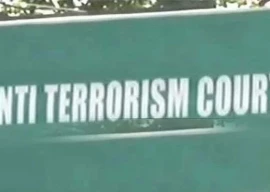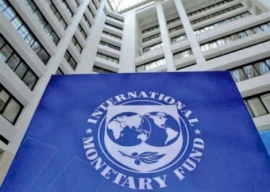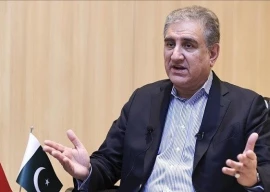
Deciding to join a path which might be difficult to tread on, key players across the country’s political landscape have vowed to forge greater cooperation to block the country’s powerful military establishment from manipulating the next parliamentary polls.
“We want to keep the military at a decent distance from politics. We want absolute civilian control over the upcoming electoral process,” an official in the ruling Pakistan Peoples Party (PPP) told The Express Tribune on Thursday.
“We realise it will not be easy but our collective resolve can make it happen,” he asserted, commenting on the four days of talks between the government and opposition.
Negotiations were initially aimed at evolving consensus on the 20th constitutional amendment, vital for validating all the by-elections that took place between April 2010 and July last year when the Election Commission of Pakistan (ECP) was not in complete shape.
The 18th Constitutional Amendment that was passed in April 2010 made it binding for the government to appoint a retired high court judge, each from all four provinces as ECP members — a condition that could only be met in July next year, casting doubts over the 28 MPs elected during this period.
But the scope of parleys between the PPP and the Pakistan Muslim League-Nawaz (PML-N) was extended to decide how the government and opposition could combine their collective wisdom to choose caretakers to hold free and fair elections.
It was former prime minister Nawaz Sharif’s party that pushed for seeking firm guarantees from the government that a ‘totally political’ setup will oversee polls with minimum interference from any ‘apolitical’ force.
“The crux (of the dialogue) was that there shouldn’t be any more manipulation by the military,” confirmed a top leader of the opposition party, who was aware of the secret talks.
The military – throughout the country’s history – has been blamed for secretly manoeuvring electoral processes through coercive means to tilt the results in its favour, or in the favour of its chosen candidates and parties.
Officials privy to the government-opposition talks said the political leadership seems to have now realised that they need to stop this interference and vowed not to seek any support from the Inter-Services Intelligence (ISI) in future for personal gains.
There was no official word from any of the parties regarding what caused the sudden shift in the political paradigm, but it seemed that the rise of Imran Khan’s Pakistan Tehreek-i-Insaf (PTI) as a ‘third alternate force’ prompted them to put up a united front.
Khan’s mounting popularity is often pinned on secret support by the military — allegations he continues to deny.
Deal is sealed
After Thursday’s fresh round of PPP-PML-N talks, officials from both sides said they had agreed on all the aspects of the 20th Amendment and reports suggested the drafting of the key legislation was underway late into the night.
According to the final outcome, both the parties had decided to form a committee of three members from each side to finalise names for the caretaker setup in case the prime minister and the leader of the opposition in the National Assembly could not reach a consensus.
The committee would then scrutinise these names.
“The deal is sealed,” briefly commented a participant of the talks, without giving any further details.
A last minute hurdle, however, appeared to have surfaced when a key government ally – the Muttahida Qaumi Movement (MQM) – objected to the composition of the panel, demanding other groups must not be neglected.
Sources revealed that government negotiators rushed to salvage the hard-earned consensus with an explanation to the MQM that three members from the treasury benches could be from any of the allied parties or the number of members could also be raised to include other political allies.
Published in The Express Tribune, February 10th, 2012.
COMMENTS (10)
Comments are moderated and generally will be posted if they are on-topic and not abusive.
For more information, please see our Comments FAQ
1719315628-0/BeFunky-collage-(8)1719315628-0-405x300.webp)


1731329418-0/BeFunky-collage-(39)1731329418-0-165x106.webp)


1724319076-0/Untitled-design-(5)1724319076-0-270x192.webp)










I don't think without Army's support the elections would be acceptable to political parties. Because the implementing body/administration is highly corrupt,inefficient and politicized and could not be trusted in most of the cases.
without the support of army the elections could not be held free, fair and transparent
Ya got it "it seemed that the rise of Imran Khan’s PTI as a ‘third alternate force’ prompted them to put up a united front." corruption maters are together
*The Zardari Doctrine states that there is enough loot available in the country to satisfy everyone; therefore, instead of politicians fighting for power to obtain access to it they should join together and share it. Through this mantra Mr Zardari, in one clever stroke, removed all political opposition to his rule.* written by Mr F B Ali. All political parties and their leadership are benefitting from the mockery of democratic government’ and are content to accept every move from the government which will further ease their lush plush and luxurious lives. The talk shows aired in the evening are gimmicks played to keep the emotions high and vote bank intact. 20th amendment is to cover up for not complying with the constitution. It should be see in line with 8th and 17th amendment.
@WB: yes PTI WITH MQM
Technically speaking this is democracy! Leaders representing majoring grouping to fight not IK but in fact the army & the establishment. Unfortunately in PK army wishes to run the country with its own interests at heart not the piblics'..
People must understand that if IK comes to power with Army's help/backing he will now to Army's pressure instead of looking after the people. Let's us not forget IK is yet to make public his policies and change. Only when he puts them on to the table we will actually know what/ how he is going to improve the current situation our nation is in.
E Euronext please look at this objectively, not emotionally.
This agreement between the political parties would throw lot of cold water over the opponents of democracy. The two largest parties are showing lot of maturity and not giving the generals to steal govt. The nation would not forget your political maturity and sense of responsibility that is why they have voted you.
the perception of alliance of politicians on key issues is good for Pakistan especially when a new war is knocking on our borders. it is not a new phenomenon yet from 16 May 2006 politician r following this line. just read this http://www.ajfpk.org/53rdissue/innerpage.php?type=Idaria&image_id=1
IK was right. Thieves banding together
Unfortunately, Police, which has been politicized, is used for rigging ir atleast silent spectators at polling booth. Military only required at polling booth to stop rigging or any unwanted activity.
I havent experience any military person involve in rigging. Military may interfere in political system but in a different manner.
All based on unmanned officials. Oh please, please GET A LIFE!